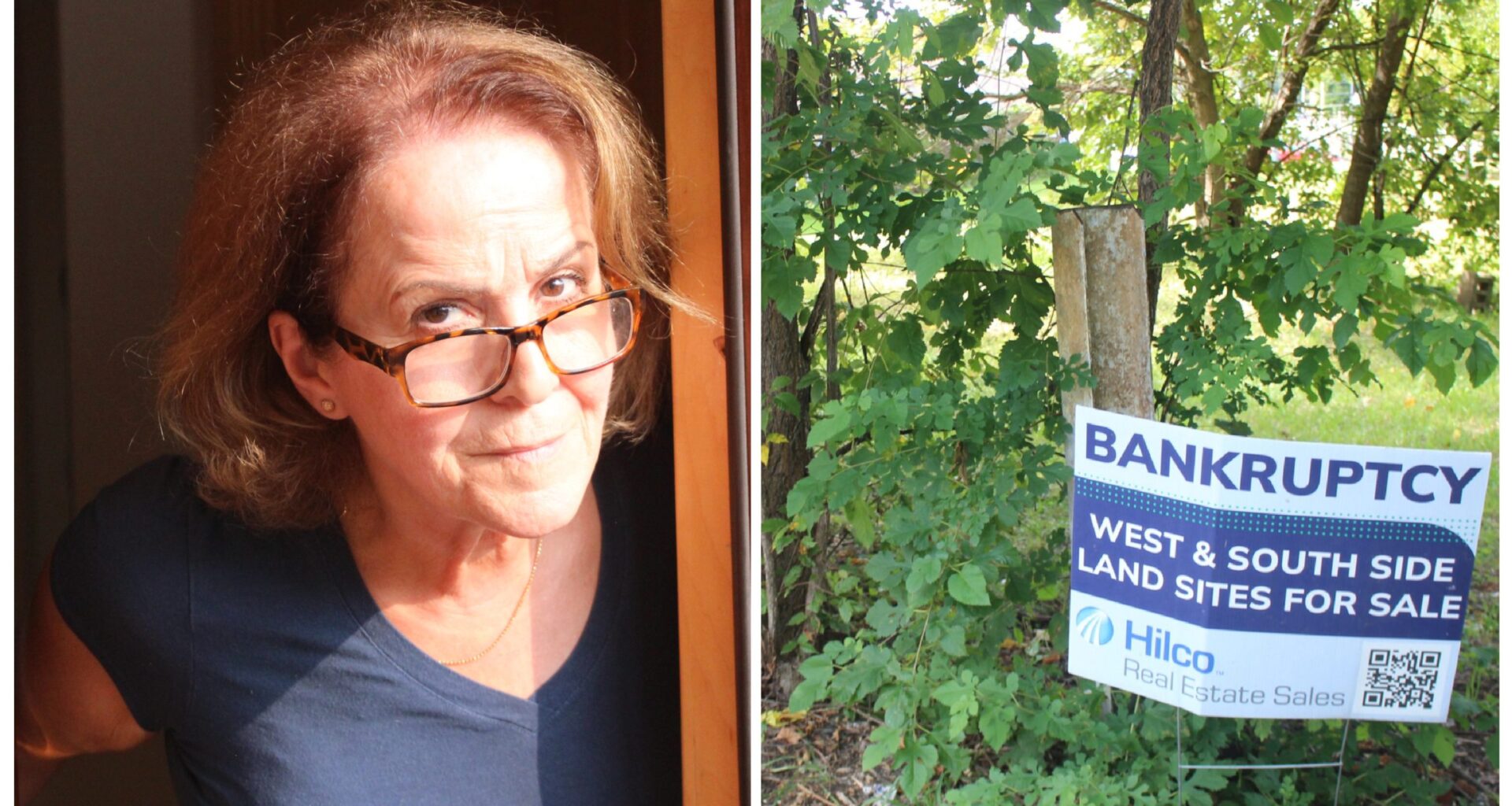This story was produced by Block Club Chicago, a nonprofit newsroom focused on Chicago’s neighborhoods, and the Illinois Answers Project, an investigations and solutions journalism news organization.
ENGLEWOOD — After decades of building a real estate empire out of overgrown vacant lots in the poorest parts of Chicago, Suzie B. Wilson and her sister agreed earlier this year to auction off the properties to pay off their companies’ mounting debts.
The city signed off on the plan, hoping the sale would bring in millions of dollars to its coffers, reduce blight and take properties out of the hands of what city attorneys have called Chicago’s “worst landowner” and put them back on the tax rolls.
But the plan failed to reach its lofty goals because nobody wanted most of the properties, and those that sold went for a fraction of their estimated value. That leaves the city without the money it anticipated and homeowners still saddled with weed-strewn vacant lots with little prospect of a solution.
Just one third of the roughly 800 parcels that belonged to Wilson and her sister, Swedlana Dass, were sold in Chicago, generating about $3.4 million and leaving more than 500 lots still sitting vacant, according to an analysis of available sale data and court documents. That’s far below the more than $12 million that Wilson said could have resulted from the sale of the top “150 to 200 properties” in the real estate portfolio.
Nevertheless, the city says that its aggressive legal approach has already yielded more than $1 million in up-front payments from the real estate empire and forced it to sell hundreds of properties.
“Whatever remuneration happens in the end, we have a single goal,” said Mary Richardson-Lowry, Chicago’s corporation counsel. “She should no longer be in the city, owning property in a way that harms communities.”
Now city attorneys are eyeing next steps in their battle against Wilson and Dass as their real estate business faces the possibility of liquidation.
The auction — the largest bulk land sale in the city’s recent history — followed reporting by Block Club Chicago and the Illinois Answers Project that showed companies owned by the sisters accrued more than $15 million in unpaid rat-related violations spread across vacant lots on the South and West sides of Chicago.
After the city sued Wilson and Dass, their network of real estate companies filed for bankruptcy in federal court and agreed to an $11.5 million settlement. As part of the agreement, the businesses agreed to “wind up their affairs and fully dissolve.”
Wilson, Dass and their attorney did not respond to messages seeking comment.
The bankruptcy case included an auction to pay the debts, but the city is unlikely to recover the full amounts it’s owed anytime soon due to the underwhelming sales figures. Proceeds from the sale first have to go to another creditor: a New York City lender who agreed to finance the bankruptcy with a loan up to $4 million.
This leaves the city in a familiar position: sitting on a seven-figure debt owed by well-known scofflaws who still own hundreds of empty lots in the poorest neighborhoods in the city, areas abundant in land that has sat vacant for generations.
The lots that were sold went to a disparate group of buyers whose plans for the properties could take years to get off the ground, according to interviews with dozens of buyers.
Some were acquired by neighbors who’ve been caring for the properties for years out of their own pockets. City agencies bought other properties that officials say will be used for affordable housing and parks.
And real estate speculators purchased dozens of lots at bargain-bin prices in the hope of flipping or developing the land down the road.
Taken together, all of these issues illustrate the intricate challenges of returning Chicago’s vacant lots to productive use.
Daniel Kay Hertz, director of housing for the public policy group Impact for Equity, said it’s a case of supply exceeding demand.
“She’s bringing 800 lots to sale, but there’s a lot of other people with vacant lots,” said Hertz, formerly the director of policy for the city’s Department of Housing.
“The day before she put these up for auction, you could go on [Chi]BlockBuilder and find city-owned lots all over the city. There’s also plenty of private owners of vacant lots all over the city.”
Lots Scooped Up In Growing Areas
Over the course of three-plus decades, Wilson and Dass slowly built their empire, mostly on the South and West sides, through Cook County’s tax and scavenger sales, according to filings in their business’ bankruptcy case.
Through these sales, buyers can purchase properties from owners who have fallen behind on their property taxes. The goal of the government program is to get tax-delinquent properties back on the tax rolls.
In 2023, Illinois Answers Project and Block Club Chicago first revealed that Wilson and Dass’ companies had racked up $15 million in city fines for neglecting their properties to the point where they had become infested with weeds, trash and rats.
After the story published, the city took legal action against their companies, filing multimillion-dollar lawsuits, claiming the properties were dump sites for tires and junk cars. The lawsuits culminated in the sisters’ companies filing for bankruptcy in federal court last year.
This April, with approval from a bankruptcy judge, Wilson and Dass put their business’ properties up for auction to pay down their debts.
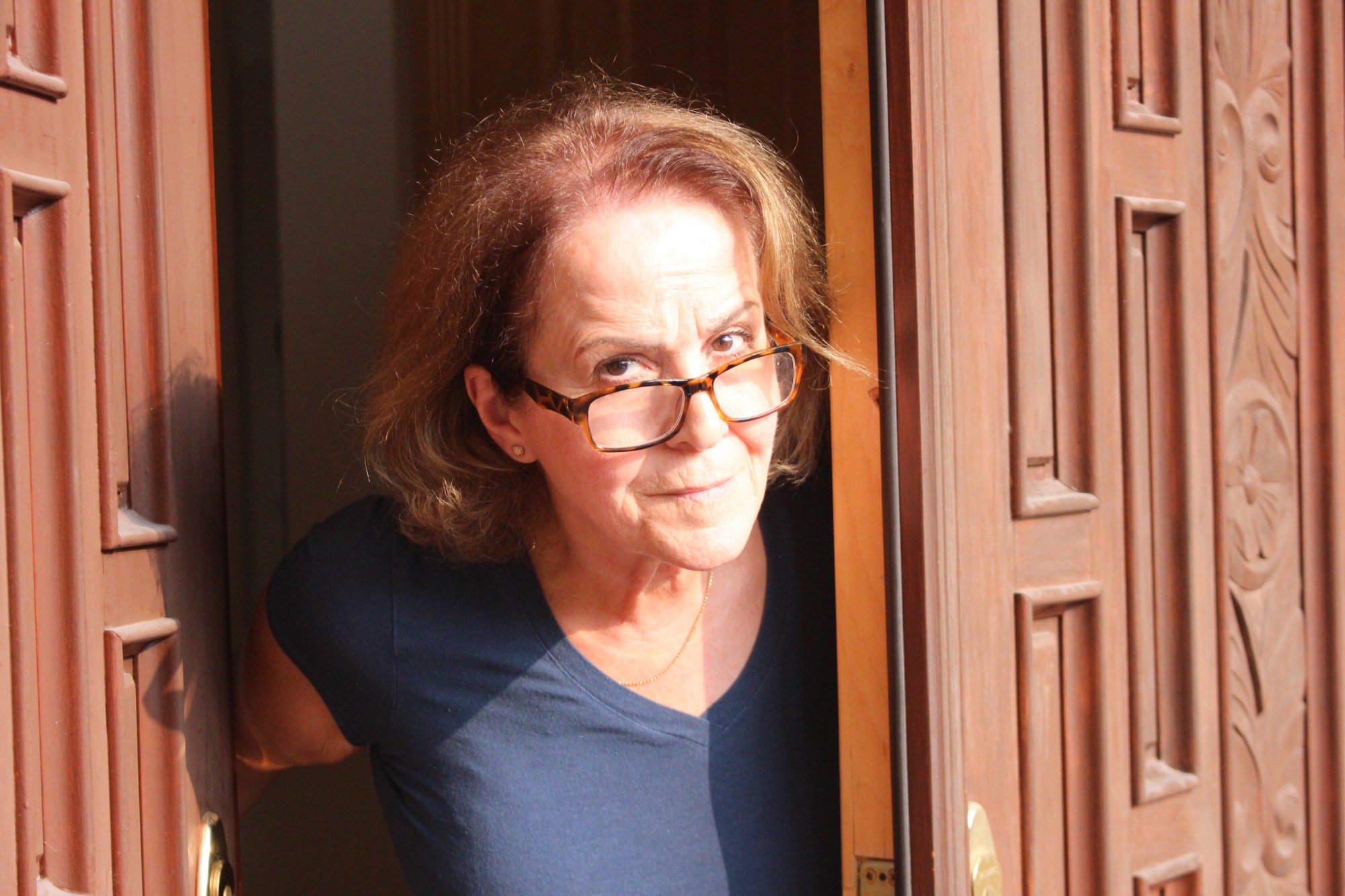 The real estate empire of businesswoman Suzie B. Wilson, shown at her Northbrook home in 2023 is facing possible liquidation amid a legal battle with the city. Credit: Mina Bloom/Block Club Chicago
The real estate empire of businesswoman Suzie B. Wilson, shown at her Northbrook home in 2023 is facing possible liquidation amid a legal battle with the city. Credit: Mina Bloom/Block Club Chicago
Hilco, the real estate company managing the auction, called the sale a “once-in-a-lifetime acquisition opportunity” for investors and neighboring property owners looking to help revitalize South and West side neighborhoods. The sisters hoped to maximize their property values through a “robust sale process.”
But so far, available sales data shows that a little more than 250 properties have sold through the auction. In court filings, the bankruptcy trustee indicates that an additional 25 properties have been sold. But details from those sales were not included in the filings, and in some instances, some of those property sales may have fallen through.
Block Club Chicago and Illinois Answers Project analyzed the list of buyers and interviewed two dozen residents, developers and officials from city agencies that bought the properties.
A majority of the lots that sold went for $5,000, and sales followed real estate trends in the city. Investors flocked to hotter real estate markets, while hundreds of parcels in economically distressed neighborhoods such as West Pullman and Greater Grand Crossing didn’t attract many bidders.
One hot spot was the city’s West Side. Buyers purchased 30 of 31 of the properties for sale in Austin, East Garfield Park and West Garfield Park.
Five vacant lots in Garfield Park and four others on the West Side went to Bryon Finke, a property flipper who said the auction purchases were “almost entirely speculative” in that he aims to sell or lease the lots for a profit in the future. In the meantime, his development company has a maintenance team that will take care of the parcels, he said.
“I have a very grandiose vision of what [Garfield Park] could become with the right leadership,” Finke said, adding that the Madison Street corridor, where he’s made several other investments, was once a bustling shopping district.
“As the neighborhood turns around, we think it’s gonna change pretty quickly.”
Similarly, seven of 10 lots sold in South Chicago, a neighborhood prime for real estate speculation due to the planned quantum computing campus on the former US Steel South Works property. All the lots are about a mile or less from the site.
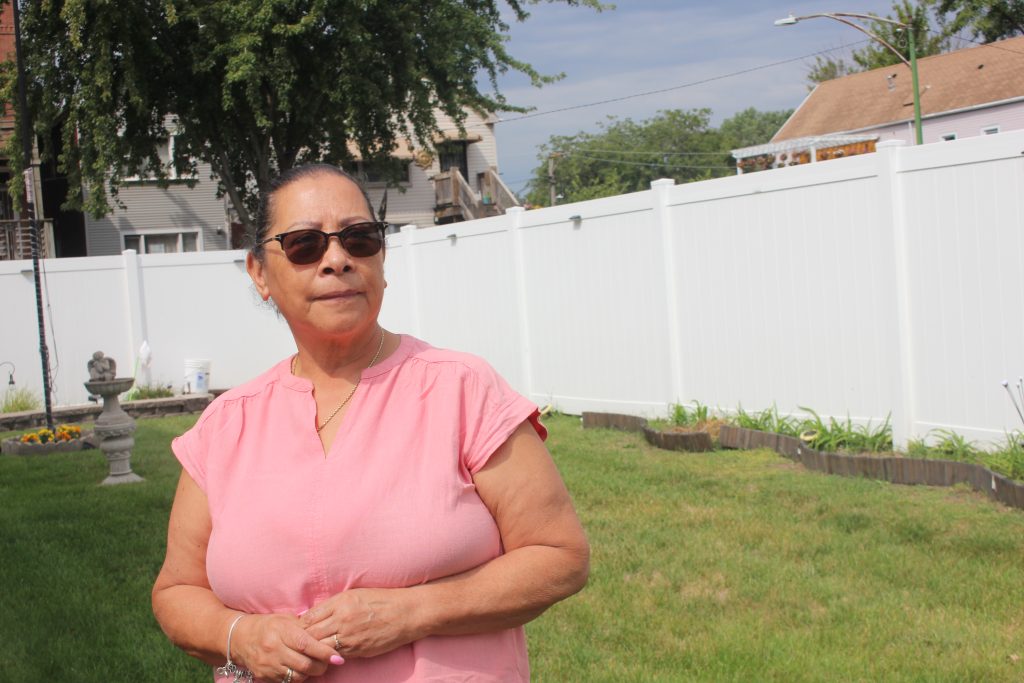 Cynthia Robles bought the lot next to her home, in the 8500 block of South Buffalo Avenue, after taking care of it for years. Credit: Mina Bloom/Block Club Chicago
Cynthia Robles bought the lot next to her home, in the 8500 block of South Buffalo Avenue, after taking care of it for years. Credit: Mina Bloom/Block Club Chicago
Cynthia Robles purchased a lot next to her home in part of the community known as The Bush. She said she’d been taking care of the property since a fire in the mid-1990s burned down the house that sat on it.
As the years went on, she planted grass and perennials, added a concrete patio and eventually installed a $8,500 fence around the perimeter of the lot, creating a lush oasis for her family while knowing its owner could take it away at any time. She said all she could find out about the owner was a P.O. box.
Robles, who recently retired from a long career as a supervisor at jails across the state, ended up paying $5,000 for the lot, plus a couple thousand dollars in closing costs.
She said she’s pleased the land is finally hers.
“It’s peace of mind because I never had that,” Robles said.
Sale Brings Promise And Obstacles
Ald. Jeanette Taylor (20th) says vacant, neglected land is a big problem in her ward, which includes most of Woodlawn and parts of Washington Park, Hyde Park, Back of the Yards and Fuller Park.
Thirty-two of the 47 lots put up for auction in her ward were sold, including all 12 in Washington Park, which is bolstered by its proximity to the University of Chicago and the Obama Center.
Taylor said the lot sale shows that the city needs to crack down on city code violators.
“The city should be saying, ‘You’ve had it for 10 years, you’ve done nothing on it, we’re taking it back,’” she said.
The city agrees that neglectful property owners should “not be allowed to continue to own them,” Kristen Cabanban, spokesperson for the city’s Law Department, said in an email.
“That is why we have made it a priority to force the sale of lots owned by these recalcitrant individuals,” she said.
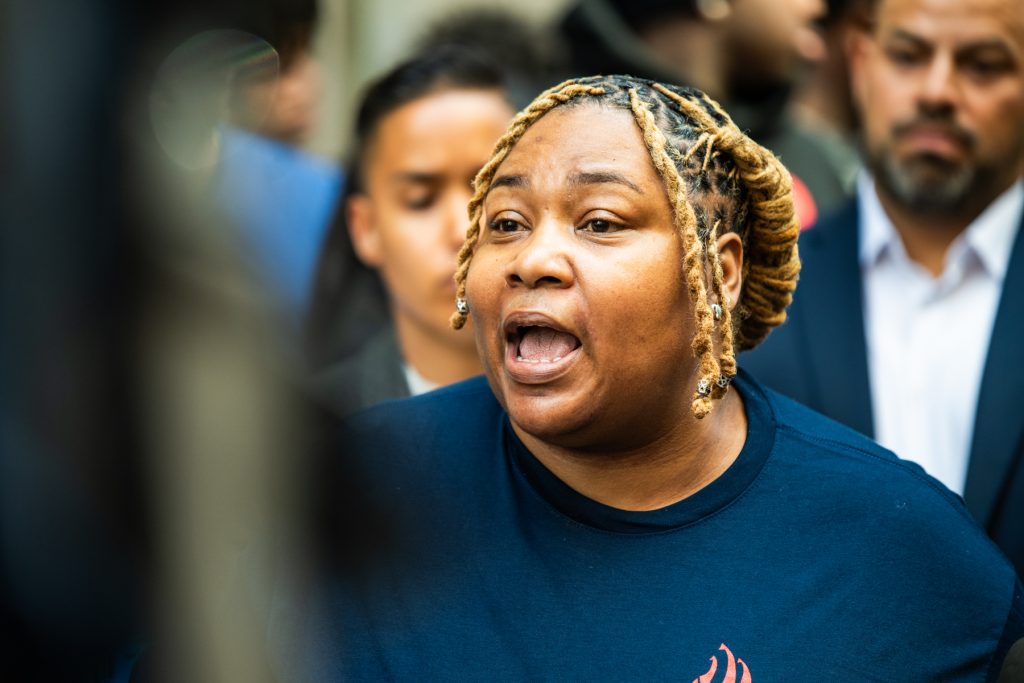 Ald. Jeanette B. Taylor (20th) speaks at a press conference decrying the proposed snap curfew before a City Council meeting on June 18, 2025. Credit: Colin Boyle/Block Club Chicago
Ald. Jeanette B. Taylor (20th) speaks at a press conference decrying the proposed snap curfew before a City Council meeting on June 18, 2025. Credit: Colin Boyle/Block Club Chicago
Open land is ubiquitous in Englewood and West Englewood, where Wilson and Dass own their largest concentration of properties.
Of the 362 lots for sale in these two neighborhoods alone, fewer than a quarter sold.
The purchases include one of the few commercial properties in the auction — a 24-hour tire repair shop in the 6100 block of South Ashland Avenue that’s guarded by an alert Doberman Pinscher named Duchess.
“There was garbage everywhere, holes in the ceiling, used cars that didn’t belong to anyone; it looked like a junkyard,” said Eduardo Ramos, owner of UKO Tire and Auto Repair. “I had to get electricity in here, and the plumbing fixed.”
Also in Englewood, Dwayne Herbert bought three lots for $5,000 each — one next to the apartment building he owns and two across the street.
Herbert, who also lives in the multiunit building, plans to turn the lot next door into a side yard with fencing and a gazebo for him and his tenants to enjoy. He’s considering building affordable housing on the other lots.
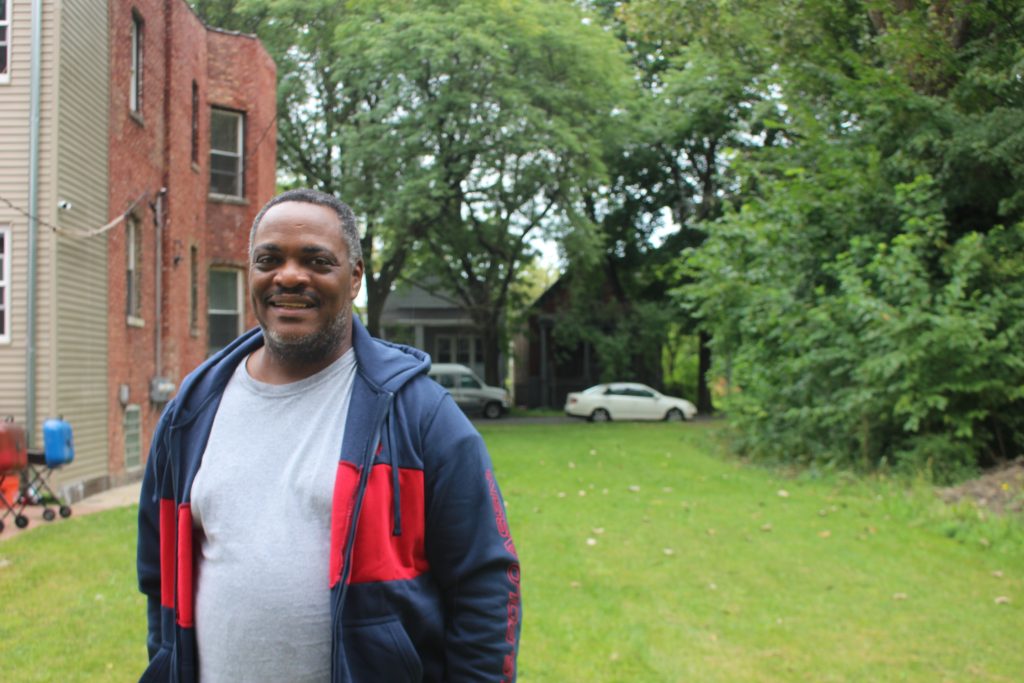 Three of the Englewood lots went to Dwayne Herbert, who owns and lives in an apartment building in the 6500 block of South Carpenter Street. Credit: Mina Bloom/Block Club Chicago
Three of the Englewood lots went to Dwayne Herbert, who owns and lives in an apartment building in the 6500 block of South Carpenter Street. Credit: Mina Bloom/Block Club Chicago
“It’s more than just a money investment. It’s an investment in a movement,” said Herbert, who moved to the South Side neighborhood from Rogers Park a few years ago. “It’s an opportunity to get in on the ground floor of a neighborhood that’s resurging back.”
The City of Chicago bought three properties in West Englewood and Roseland for $182,000 for future transit-oriented developments near existing and planned Chicago Transit Authority stations, according to deputy commissioner Peter Strazzabosco and documents obtained through a public records request.
The CTA also bought one property, near Fernwood Park on the far South Side, as part of the Red Line extension project, according to CTA spokesperson Tammy Chase.
The transit agency plans to work with the Chicago Park District to convert the lot — and other nearby parcels — into park space to replace the portion of Fernwood Park that will be lost when the train tracks are moved.
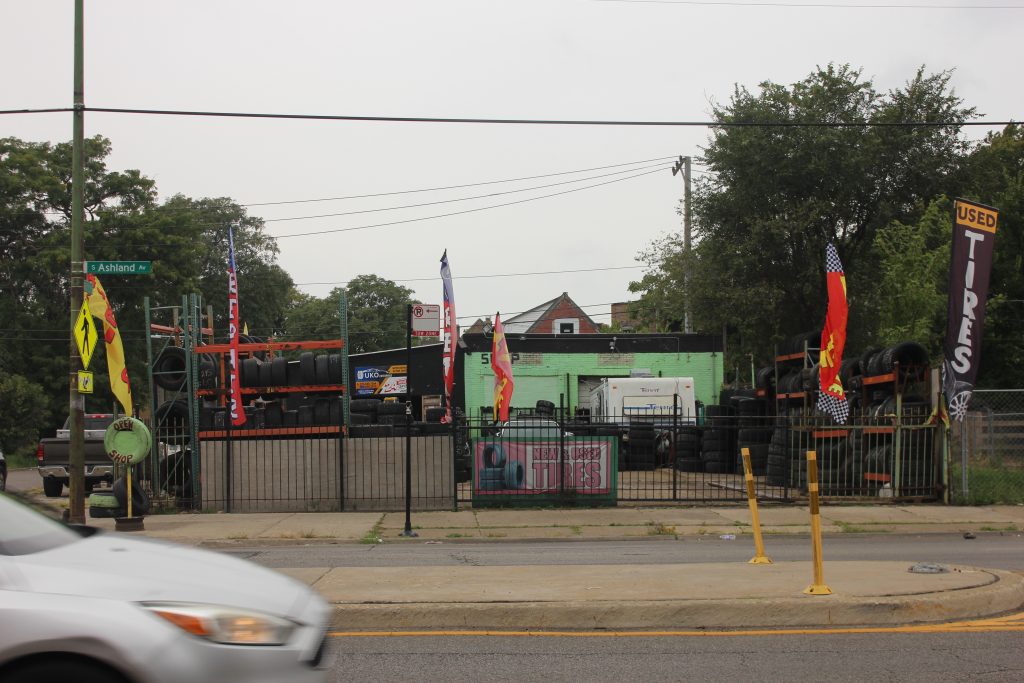 Most of the properties that went up for auction are empty, but one that sold in the 6100 South Ashland Avenue in Englewood is home to a 24-hour tire shop. Buyer Eduardo Ramos said the shop was falling apart before he became owner. Credit: Mina Bloom/Block Club Chicago
Most of the properties that went up for auction are empty, but one that sold in the 6100 South Ashland Avenue in Englewood is home to a 24-hour tire shop. Buyer Eduardo Ramos said the shop was falling apart before he became owner. Credit: Mina Bloom/Block Club Chicago
Still, experts warned that even some of the purchased lots could sit vacant for years if the new owners can’t get financing or city approval for their redevelopment plans.
Through the auction, mother-and-son property investors Soudabeh and Nima Pourian bought about a dozen lots on the city’s West Side, court filings show. The lots are not far from the site of the family’s longtime business on Cicero Avenue, an auto repair shop and taxi depot that they later converted into a car dealership.
Soudabeh Pourian said some of their development plans hinge on getting approval from their local alderperson to change the zoning designation of the sites they purchased. If they can’t, they may sell the properties as they appreciate in value, she said.
“It depends on the alderman because they don’t allow you to do certain things,” she said.
Chicago’s Empty Lot Problem
The sisters’ real estate portfolio, while massive, only represents a fraction of the vacant lots across Chicago, concentrated in disinvested neighborhoods on the South and West sides.
As of 2023, the city owned more than 10,000 vacant lots, and an additional 16,634 were approaching vacancy due to unpaid taxes and fees, according to The Wall Street Journal.
A city spokesperson said the city currently owns “just over” 7,000 empty lots available for purchase.
Numerous initiatives launched over the years to revive city-owned lots, such as the Large Lots Program, ChiBlockBuilder and the Chicago Recovery Plan, have seen varying degrees of success.
But much of Chicago’s vacant land is privately owned like Wilson’s and Dass’ properties.
Privately-held land is more difficult to develop because “ownership can be all over the map,” said Geoff Smith, executive director of the DePaul Institute for Housing Studies. It can be challenging to figure out who owns the land, let alone take control of it, Smith said.
A recent WBEZ investigation found that property owners are increasingly using LLCs, or limited liability corporations, in Chicago. These entities may provide business owners and investors with anonymity or insulate them from legal risk, but can make it more difficult for tenants to find out who owns their buildings.
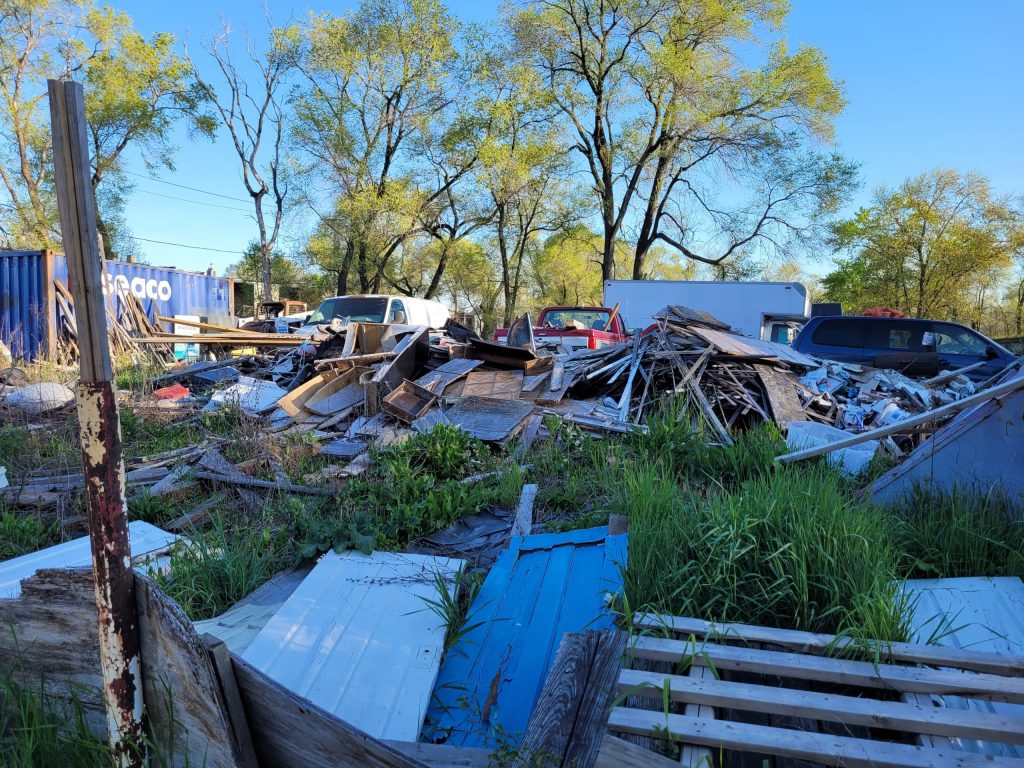 The property at 6956 S. Wallace in the Englewood neighborhood is one of hundreds the city of Chicago cited in its lawsuit against the real estate empire. Credit: City of Chicago court filing
The property at 6956 S. Wallace in the Englewood neighborhood is one of hundreds the city of Chicago cited in its lawsuit against the real estate empire. Credit: City of Chicago court filing
Wilson and Dass assembled their empire of vacant lots through more than 20 LLCs with names such as Dagny, Daisyland, Darcy, Darden, Debrox, Derby, Dion, Direct, Discount Inn, Distinctive, Dorchester and Dover.
A Hilco spokesperson declined to comment and refused to answer any questions about plans for the sisters’ 500-plus unsold properties.
According to a court order, Hilco has been paid $300,000 and stands to make a sales commission beginning at 7%. The firm can either continue selling the remaining properties or “propose an alternative process.”
After a judge approved the auction’s bids in early May, Hilco sold more than 40 additional properties in separate sales, court filings show.
The unsold properties are controlled by the trustee in the bankruptcy court, but are still owned by Wilson and Dass, according to property records.
According to documents, Wilson and Dass have filed for Chapter 7 bankruptcy and are expected to liquidate their remaining assets. In that instance, remaining properties should “go back on the market … in a process that works better for straight liquidation,” David Holtkamp, deputy corporation counsel for the city said in an interview.
If Wilson and Dass reclaim their properties, which they are legally entitled to do, city attorneys plan to go after them again in state court.
Richardson-Lowry, Chicago’s corporation counsel, said they would pursue them “relentlessly” due to poor stewardship of land in more than 25 city wards.
“If anyone thinks this is over, they’re not paying attention,” she said.
 Longtime Englewood residents Leonard and Jacqueline Washington live near one of the unsold lots, in the 6500 block of South Sangamon Street. Credit: Mina Bloom/Block Club Chicago
Longtime Englewood residents Leonard and Jacqueline Washington live near one of the unsold lots, in the 6500 block of South Sangamon Street. Credit: Mina Bloom/Block Club Chicago
On a recent afternoon, an unsold lot on the 5700 block of South Emerald Avenue in Englewood was littered with beer bottles, plastic bags and a pile of tree branches. It’s one of a few empty lots on the block.
“I grew up on the West Side, so I’m used to vacant lots,” said neighbor Faye Simmons, who lives down the street, but works as a bus monitor out of suburban Burbank.
Another Englewood lot that Wilson and Dass still own, in the 6500 block of South Sangamon Street, has become a drug hangout along with a rundown house next door, according to neighbors Leonard and Jacqueline Washington.
Jacqueline Washington, a lifelong resident of the block, hopes a buyer comes along and builds a house on the abandoned lot.
“It will give people somewhere to go who don’t have nowhere to go,” she said.
Haru Coryne contributed to this story.
Listen to the Block Club Chicago podcast:
